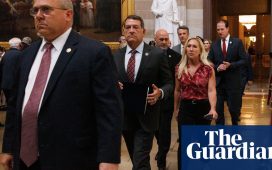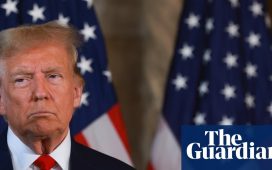Donald Trump has defended his decision to impose new tariffs on Mexico as stock markets worldwide were rattled by fears of an escalation in trade tensions.
“Mexico has taken advantage of the United States for decades,” Trump tweeted. “Because of the Dems, our Immigration Laws are BAD. Mexico makes a FORTUNE from the U.S., have for decades, they can easily fix this problem. Time for them to finally do what must be done!”
On Thursday Trump announced that he was placing a 5% tariff on “every single good coming into the United States from Mexico” starting on 10 June, to pressure the country to do more to curb immigration into the US.
The tariffs will rise by 5% each month until it reaches 25% in October if the number of people crossing the border doesn’t “come down substantially”, the White House acting chief of staff, Mick Mulvaney, said.
The Trump administration’s decision led to a sell-off in stock markets around the world. In the US the Dow Jones Industrial Average fell 355 points, or 1.4%, at close of trading. In London the FTSE 100 dropped 0.8% as all the European markets fell.
Mexico is the US’s largest trading partner. Last year it sent about $346.5bn of goods such as avocados, tomatoes, clothes and cars across the border. A 5% tariff would amount to a tax increase of more than $17bn that will largely be passed on to US consumers.
The Business Roundtable, one of Washington’s most influential lobby groups, called the decision a grave error.
“Business Roundtable strongly urges the administration not to move forward with these tariffs, which would create significant economic disruption and tax US workers, farmers, consumers and businesses,” it said in a statement.
“Unilateral tariffs on all Mexican imports will not solve the urgent problems of securing our border and fixing our broken immigration system. We urge the administration to engage constructively with our neighbors and allies to resolve trade, migration and security issues in ways that will benefit Americans, not cause economic damage.”
Tariffs are border taxes charged on foreign imports. Importers pay them upon entry to the customs agency of the country or bloc imposing them.
Tariffs can be levied in different ways. It can be a flat-rate tariff linked to weight, or calculated as a proportion of the overall value of the goods. It can also be a mixture of both. A country can set a quota, enabling a certain volume of a product to flow in before a higher tariff rate kicks in.
Tariffs raise money for governments, but are primarily used to raise the price of foreign goods, protecting domestic producers from global competition.
Countries signed up to the World Trade Organization (WTO) must impose tariffs at the same level for all other WTO-member trading partners under the organisation’s “most favoured nation” rule – unless they secure alternative deals with particular countries or trading blocs.
Trump’s move comes as the US, Mexico and Canada are still negotiating the United States-Mexico-Canada Agreement (USMCA), a trade pact to replace the North American Free Trade Agreement (Nafta). The potential collapse of the ratification of USMCA and fears that Trump will use tariffs to further other political aims sent stocks, bonds and the price of oil lower on Friday.
The announcement came after US Customs and Border Protection said a group of 1,306 people had been apprehended crossing the border in El Paso, Texas. The group was the largest ever apprehended at the border and included 63 unaccompanied minors.
Thousands of people remain stranded in the southern Mexican state of Chiapas, unable to obtain immigration documents, while asylum seekers must wait in northern Mexican border cities as their cases are heard in US courts.
Mexico’s leftwing president, Andrés Manuel López Obrador, commonly called “Amlo”, responded to Trump with a two-page letter in which he wrote: “The Statue of Liberty is not an empty symbol … With all due respect, even though you have the right to say it, ‘make America great again’ is a fallacy because, until the end of times, and beyond national borders, universal justice and fraternity should prevail.”
López Obrador offered his US counterpart history lessons on past periods of cordial US-Mexico relations. He also included details of his plans to develop Central America to stop migration and warned: “I don’t lack courage, I’m not a coward nor timid; rather, I act on principles.”
Trump has accused the Mexican government of failing to do enough to crack down on the number of migrants entering the US in search of asylum from Central American countries including El Salvador, Honduras and Guatemala.
López Obrador, however, was blunt about the crisis. “President Trump, social problems aren’t resolved with taxes or coercive measures,” he said, defending his administration’s handling of the migration issue.
The news elicited support for Mexico from China, which is also involved in an escalating trade row with the US. In Beijing, the foreign ministry spokesman, Geng Shuang, said: “The United States has repeatedly taken trade bullying action. China is not the only victim.”






